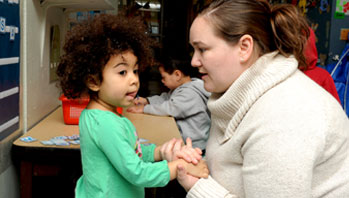- books about feelings and emotions
Feelings Are Important!

© Commonwealth of Massachusetts, Department of Early Education and Care (Jennifer Waddell photographer). All rights reserved.
When a toddler has not learned the words she needs to express her feelings, she can get frustrated, act out, or shut down.
Educators can help children learn the words and strategies they need to express feelings appropriately, stay safe, handle new situations, and resolve conflicts.
Use the following ideas to help a toddler put her feelings into words as you talk and play together.
- Notice her expressions and body language as you help her put into words what she might be feeling. For example, you might say, That loud siren scared you!
- Talk about how a character might feel as you read a book together. Connect it to a similar situation she encountered.
- Help her recognize another child’s feelings. For example, you can say, Jojo is smiling. I think he wants to play with you.
- Acknowledge when she is upset or angry and help her calm down so she can use her words.
Toddlers have strong feelings and often they are not able to manage them on their own. Here are a few ideas on how to offer toddlers positive guidance that helps them build both self-control and language.
- Offer toddlers simple choices, such as “Do you want to use red paint or blue?”
- Explain why as you move a toddler away from danger and tell her what she can do instead.
- Teach short phrases such as “touch gently” and “Mama come back” that toddlers can say to themselves.
- Model using polite words. Practice one-on-one, as a group, and with puppets.
- Help children use strong voices to protect themselves.
- Ask family members for strategies that work best with their children.
